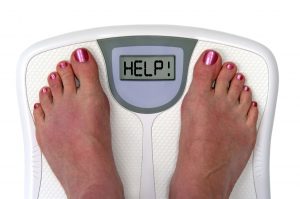Six Diseases That Could Be Preventing You From Losing Weight
 Obesity is generally a result of overeating, but a small number of people keep on weight as a symptom of another disease.
Obesity is generally a result of overeating, but a small number of people keep on weight as a symptom of another disease.
The following are some diseases that may prevent you from losing weight.
Hormonal Diseases
Hypothyroidism is a condition in which the thyroid gland, which is located in the throat, produces little thyroid hormone. When this hormone is not secreted at the appropriate level, the metabolism slows and causes weight gain.
A simple blood test can be performed to detect hypothyroidism and check hormone levels. In the event of hypothyroidism, a doctor can prescribe the appropriate medication for counteracting the disease.
Cushing’s Syndrome occurs when the adrenal glands, which are located on top of each kidney, produce an excess of a steroid hormone called cortisol. This can lead to an accumulation of fat in places like the face, upper back and abdomen.
Symptoms of the disease include high blood pressure, osteoporosis, and changes in skin color and quality. Additional symptoms may include silvery or purple stretch marks on the abdomen and red cheeks.
Organ and Muscular Diseases
Disease in the kidney, heart or liver can cause fluid retention. This appears as puffiness throughout the body, especially near the eyes and ankles.
Many muscoskeletal conditions like plantar fascitis can result in weight gain, especially because it forces a patient to cut back on regular exercise. Osteoarthritis and knee or hip pain can also cause unwanted weight accumulation.
Psychological Conditions and Outside Factors
Those who suffer from depression are more likely to overeat and therefore gain weight. Patients will often engage in emotional eating to fill a void in their life and find a comfort in devouring sweets.
Certain medications like steroids, antidepressants, high blood pressure drugs and seizure medications can contribute to weight gain. Only a doctor can determine if these medications are responsible for an increase in body weight.
Source: Wed MD
 Eating Disorder Self Test. Take the EAT-26 self test to see if you might have eating disorder symptoms that might require professional evaluation. All answers are confidential.
Eating Disorder Self Test. Take the EAT-26 self test to see if you might have eating disorder symptoms that might require professional evaluation. All answers are confidential.